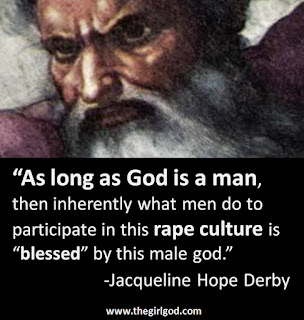Several days ago, Time Magazine posted a piece by Eve Ensler entitled Eve Ensler on Bill Cosby: Let the Mythical Daddy Die.
It was a brilliant essay, however I have a few things to add.
In her piece, Ms. Ensler asks: "Are we finally willing to do what is necessary to make women safe?" I would argue that we need a massive overhaul of our religious institutions if we want to make a difference in how many women and girls are raped every day in nearly every culture throughout the world.
We can't "create a climate where all women are safe and protected socially and economically" until we confront the roots of these inequalities in our religious texts. It is time for religious leaders to say--BOLDLY--that they will no longer sanction rape or abuse.
Patricia Lynn Reilly wrote of one such incident in the Old Testament:
"Amnon, the son of King David, prepared to rape his sister Tamar. In response she said, “No, brother, do not violate me, we do not do such foolish things in Israel. Where could I go and hide my shame? And you would sink as low as any fool in Israel. Why not speak to the king for me? He will not keep me from you.'”
The Hebrew Scripture continues, “He did not want to hear her voice. He was stronger than she. He raped her. Then Amnon was filled with utter hatred for her, greater than the desire with which he desired her. He said to her, ‘Get up and go.’ She answered, “No, it is wicked to send me away. This is a greater evil than all you have done to me.”
Of the many women who read and experienced Tamar’s story through A God Who Looks Like Me, only one had heard this story before: ”My great aunt was a preacher,” Joanne shared, “She sat me on her lap with her great big King James Bible and said, ‘There are some things in this book that men won’t tell you; some stories that won’t be told in the church. This is one from II Samuel chapter 13.’ And then she read Tamar’s story to me.”
Perhaps if the religious institutions of our childhoods had listened to Tamar’s story and allowed her firm “NO” to challenge its ways, our stories would have been encouraged out of the silence of denial and shame much sooner. Her “No” was a courageous act on her own behalf. With great clarity of vision in a dangerous moment, she challenged her brother’s behavior and named it as a violation, as a foolish thing, as low, wicked, and evil. She is the only one in the entire Hebrew Scriptures to name Amnon’s sin!"
This is not meant to be a comprehensive essay, although I do hope to come back to it. I also hope that others will tackle the subject in the weeks to come. A God Who Looks Like Me is a good place to start for those interested in the changes needed. I also believe it should be required reading for all clergy.
One only has to go to sites such as Our Stories Untold to see how exclusive male imagery is used to subordinate, abuse and silence women and girls.
I would argue that, at the root of the "mythical daddy" is the image of "God the Father".
He needs to go first.
---
Further Reading - I will try to keep adding to this as my time allows - and please post additional links as comments.
Read here for a discussion "about what children being abused get out of Biblical stories, including the story of Jesus dying on the cross. Ultimately, what I took away was that all people, including children, go to church looking for meaning. And in this quest for meaning, often the language and theology used to give meaning is actually counter-intuitive to a person’s spiritual growth and relationship with self, others, and God. How can we set up the story of Jesus in a way that protects children and doesn’t cause further harm in abuse situations?"
The Book of Mary - Father God's Will


Comments
Post a Comment